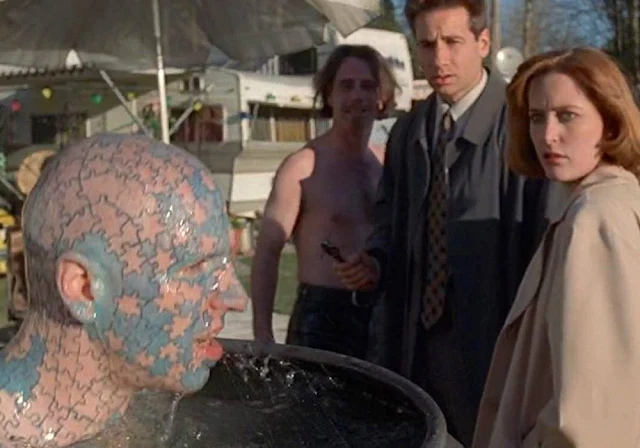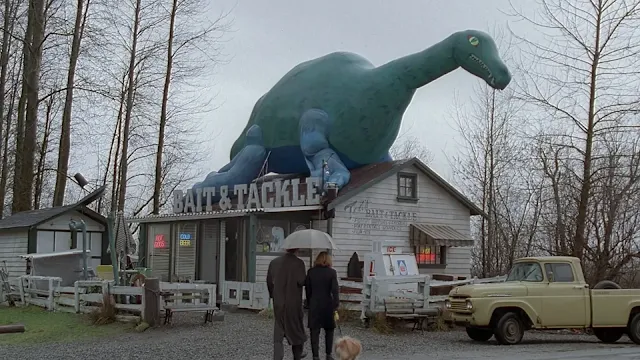The Best 'Monster of the Week' Episodes from The X-Files
The X-Files redefined episodic television with its iconic "Monster of the Week" format, offering fans a dazzling array of self-contained narratives that showcased the show’s imaginative scope. These episodes stood apart from the mythology-driven conspiracy arcs, delving into standalone tales that explored the strange, macabre, and sometimes absurd. They embodied the series' fearless genre-blending, veering seamlessly between horror, science fiction, dark comedy, and the outright surreal.
From grotesque mutants to supernatural enigmas, the “Monster of the Week” episodes pushed creative boundaries, delivering gripping stories rooted in urban legends, folklore, and cultural fears. These episodes often doubled as incisive commentaries on societal anxieties, tapping into a zeitgeist shaped by distrust of authority, fear of the unknown, and fascination with the paranormal.
Despite their standalone nature, they offered sharp character insights, deepening the dynamic between Mulder’s zealous belief in the extraordinary and Scully’s skeptical empiricism. Whether terrifying, whimsical, or darkly satirical, these episodes remain essential viewing for fans of inventive storytelling. Here’s a dive into some of the most memorable and celebrated “Monster of the Week” episodes from The X-Files, each a testament to the series’ legacy as a masterclass in suspense and creativity.
The Essential Episodes
A curated selection of the most memorable standalone monster episodes.
"Squeeze"Season 1, Episode 3 | Written by Glen Morgan & James Wong
"Squeeze" marks The X-Files' first true foray into the "Monster of the Week" format, setting a high bar for the episodes that followed. It introduces Eugene Victor Tooms, a mutant killer with the grotesque ability to stretch and contort his body to slip through impossibly tight spaces. Tooms preys on victims to harvest their livers, which he consumes to hibernate for decades. The dark, claustrophobic tone is palpable, as Mulder and Scully chase a predator who embodies primal fears of invasion and violation. What makes "Squeeze" enduring is how it establishes The X-Files' knack for making the extraordinary eerily believable. A key moment sees Tooms’ yellow eyes glowing in the dark—a haunting image that cemented him as one of the series’ most iconic villains.
"The Host"Season 2, Episode 2 | Written by Chris Carter
This is the quintessential X-Files “Monster of the Week” installment that melds body horror with ecological dread. The episode introduces the unforgettable Flukeman, a grotesque, humanoid parasite born from radioactive contamination in the sewers of Newark, New Jersey. Its origin as an unintended byproduct of industrial waste reflects the show’s recurring theme of humanity’s reckless relationship with nature. The episode is notable for its unrelenting atmosphere of decay and unease, from its nauseatingly claustrophobic sewer scenes to the disturbing visual of the Flukeman’s sucker-like maw. A standout moment sees the creature disgorged into a sewer pipe, alive and ready to haunt the deep—a haunting metaphor for humanity’s inability to fully contain the fallout of its actions.
"Humbug"Season 2, Episode 20 | Written by Darin Morgan
"Humbug" is a daring and deeply satirical episode that flips The X-Files formula on its head. Mulder and Scully travel to a Florida town populated by retired circus performers to investigate bizarre murders. Darkly humorous and oddly tender, the episode interrogates societal definitions of normalcy, turning the investigative spotlight on Mulder and Scully as outsiders. Morgan’s razor-sharp script is packed with biting wit and poignant commentary on prejudice. "Humbug" broke ground as the first X-Files episode to embrace overt comedy, showcasing a unique ability to balance levity and horror. Its lasting legacy is its challenge to viewers: who are the real monsters—those who look different or those who judge them?
"Die Hand Die Verletzt"Season 2, Episode 14 | Written by Glen Morgan & James Wong
One of the darkest and most unnerving episodes, blending supernatural horror with biting social commentary. The story unfolds in the seemingly sleepy town of Milford Haven, where Mulder and Scully investigate a grisly death linked to a Satanic ritual. They uncover a group of hypocritical parents who practice occult rituals for selfish gain. When their rituals go wrong, they awaken a malevolent force embodied by Mrs. Paddock, a substitute teacher. The episode dissects themes of moral panic and hypocrisy, drawing from the “Satanic Panic” of the 1980s and 90s. The chilling final message on the chalkboard, “Goodbye. It’s been nice working with you,” is an iconic series moment.
"War of the Coprophages"Season 3, Episode 12 | Written by Darin Morgan
A masterclass in blending comedy, horror, and social commentary. Mulder investigates a bizarre outbreak of cockroach-related deaths, suspecting the involvement of extraterrestrial, robotic insects. Meanwhile, Scully offers grounded (and hilariously dismissive) commentary over the phone. Morgan’s script skewers humanity’s irrational fear of the unknown and the media’s role in amplifying panic. The episode’s title is a nod to *The War of the Worlds*, underscoring its theme of mass hysteria, complete with a fourth-wall-breaking visual gag that left many viewers swatting at their own TV screens.
"Chinga"Season 5, Episode 10 | Co-written by Stephen King & Chris Carter
A chilling blend of Stephen King’s signature small-town horror and The X-Files’ eerie style. Scully’s vacation in coastal Maine is interrupted by gruesome deaths linked to a sinister doll wielded by a young girl named Polly. The cursed toy drives townspeople to commit horrifying acts of self-harm. King’s influence is evident in the moody atmosphere and claustrophobic terror. The doll’s chilling refrain of "I want to play!" and its eerie, lifelike gaze are indelibly haunting.
"Sanguinarium"Season 4, Episode 6 | Written by Valerie & Vivian Mayhew
This episode plunges into the macabre world of vanity and greed in a high-end plastic surgery clinic. Mulder and Scully investigate bizarre deaths linked to cosmetic procedures gone horrifically wrong, revealing a surgeon using black magic to maintain youth and success by sacrificing patients. The episode excels in its visceral horror and its critique of society’s obsession with beauty, underscored by the title's Latin origin for “bloodthirsty.”
"Quagmire"Season 3, Episode 22 | Written by Kim Newton
This episode merges cryptozoological intrigue with a poignant exploration of Mulder and Scully’s dynamic. The agents investigate deaths linked to a possible lake monster named “Big Blue.” The heart of "Quagmire" lies in the now-iconic “conversation on the rock,” where the stranded agents engage in a deeply philosophical dialogue about life, loss, and obsession. This quiet, intimate moment is a fan favorite for its deft balancing of monster-hunting suspense and profound emotional resonance.
"Badlaa"Season 8, Episode 10 | Written by John Shiban
A grotesque tale of vengeance and exploitation. A mysterious Indian mystic, portrayed by Deep Roy, uses supernatural abilities to infiltrate the bodies of his victims, smuggling himself into the U.S. inside another person’s stomach. The episode’s horror hinges on visceral, body-focused dread, but beneath the gore lies a layered exploration of cultural dislocation and post-colonial exploitation. Scully takes center stage here, grappling with her own evolving beliefs about the inexplicable.
"Familiar"Season 11, Episode 8 | Written by Benjamin Van Allen
A haunting return to The X-Files’ dark roots, combining supernatural horror with a dissection of small-town paranoia. A boy’s murder appears linked to “Mr. Chuckleteeth,” a nightmarish children’s character brought to life by witchcraft. The episode explores how fear can spiral into collective hysteria, reminiscent of the Salem witch trials. The title "Familiar" refers both to the witch’s familiar spirit and the eerie sense of déjà vu in the story’s themes of scapegoating and moral panic.
"Arcadia"Season 6, Episode 15 | Written by Daniel Arkin
A sharp, satirical take on suburban life. Mulder and Scully go undercover as a married couple ("Rob and Laura Petrie") in a gated community to investigate mysterious disappearances. They discover a tulpa—a thought-form monster—summoned by the residents’ obsessive adherence to rules, which viciously enforces the neighborhood’s oppressive regulations. The episode explores themes of repression and the cost of striving for perfection at the expense of individuality.
"X-Cops"Season 7, Episode 12 | Written by Vince Gilligan
An inventive crossover with the reality TV show *Cops*, blending vérité-style filmmaking with paranormal horror. The episode follows Mulder and Scully's investigation in Los Angeles, captured entirely by a *Cops* camera crew. The case involves a creature that manifests as its victims’ greatest fears, creating a surreal and chaotic ride through urban paranoia. The raw, handheld aesthetic heightens the episode’s tension and unpredictability.
"Roadrunners"Season 8, Episode 4 | Written by Vince Gilligan
A harrowing, claustrophobic horror story. Scully investigates a disappearance in a remote desert town, uncovering a cult that worships a parasitic slug-like creature they believe to be divine. When Scully becomes the cult’s next target, the episode becomes a visceral fight for survival. The stark, isolated setting and exploration of blind faith create a suffocating sense of dread. Doggett’s late arrival to rescue Scully marks a poignant beginning of mutual trust between them.
"Lord of the Flies"Season 9, Episode 5 | Written by Thomas Schnauz
A darkly comedic and grotesque installment that takes a satirical jab at reality television and teen culture. A bizarre death during the filming of a *Jackass*-style stunt show leads Doggett and Scully to a high school outcast who is part human, part insect. The episode balances humor and horror, with absurd stunts juxtaposed against the boy's chilling transformation. It features a guest role from a pre-*Breaking Bad* Aaron Paul and explores themes of freakishness, identity, and the search for belonging.














